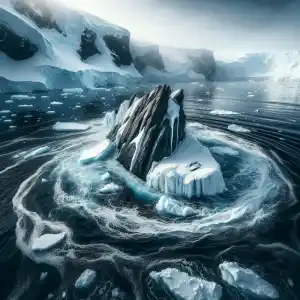Impact of Melting Antarctic Ice on Ocean Currents


Melting Antarctic Ice Sheets Will Slow Earth’s Strongest Ocean Current
The melting of Antarctic ice sheets is significantly impacting the Antarctic Circumpolar Current (ACC), the world's most powerful ocean current, according to new research.
Scientists have found that the ACC is slowing down, a phenomenon with far-reaching implications for global climate patterns, including rising sea levels, ocean warming, and disruptions to marine ecosystems.
A Threat to Ocean Circulation
A study conducted by researchers from the University of Melbourne and the NORCE Norway Research Centre predicts that, under a high carbon emissions scenario, the ACC could weaken by approximately 20% by 2050. This is due to the influx of fresh water from melting ice sheets into the Southern Ocean, altering its salinity and density, which in turn affects ocean circulation.
The study was led by fluid mechanics expert Associate Professor Bishakhdatta Gayen, climate scientist Dr. Taimoor Sohail, and oceanographer Dr. Andreas Klocker. Using high-resolution ocean and sea ice simulations, they analyzed how changing temperature, salinity, and wind patterns influence global ocean currents.
The Ripple Effects of a Weakening ACC
"The ocean is a finely balanced system. If this major current slows significantly, we could experience intensified climate variability, extreme weather patterns in different regions, and a weakened ability of the ocean to absorb carbon dioxide," explained Associate Professor Gayen.
Additionally, the ACC serves as a natural barrier, preventing invasive species from reaching Antarctica. A slowdown in the current increases the risk of foreign marine species, such as southern bull kelp and various mollusks, establishing themselves on the fragile Antarctic continent. This could have severe consequences for local ecosystems, including the diets of native species like Antarctic penguins.
The ACC’s Role in the Global Climate System
The ACC is a key component of the world's "ocean conveyor belt," a system that circulates heat, carbon dioxide, and nutrients across the Atlantic, Pacific, and Indian Oceans. More than four times stronger than the Gulf Stream, the ACC is crucial for regulating global climate and marine life. If this system weakens, it could disrupt weather patterns, accelerate climate change, and impact marine biodiversity worldwide.
The study utilized Australia's fastest supercomputer, GADI, to run detailed climate simulations. These projections indicate that ocean water transport from the surface to deep waters may also slow in the future, exacerbating climate-related issues.
Dr. Sohail emphasized that the slowdown is projected to occur even in lower emissions scenarios if ice melting continues at its current rate. "The 2015 Paris Agreement aimed to cap global warming at 1.5 degrees Celsius above pre-industrial levels, but many scientists believe we have already reached this threshold. Continued warming will accelerate ice melting and intensify the ACC slowdown.""Our models reveal mechanisms that were previously unresolved, showing that a slowing ACC is a real possibility. However, further research and real-world observations are essential to confirm these projections," said Associate Professor Gayen.
Secure Your Future with MyCourseFinder.com
Understanding climate science and global environmental changes is crucial for addressing future challenges. Students who aspire to make an impact in this field can explore top environmental science and oceanography programs with the help of MyCourseFinder.com. Our dedicated agents provide expert guidance on study options, visas, and migration matters, ensuring you choose the best educational path. Apply today through MyCourseFinder.com and take the first step toward a meaningful and impactful career!










